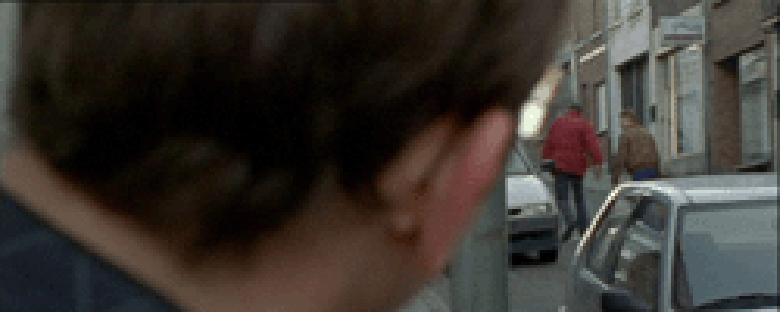Reviews
Le Fils
Jean-Pierre Dardenne & Luc Dardenne
Belgium, 2002
Credits
Review by Matt Bailey
Posted on 11 July 2004
Source New Yorker Video DVD
The directors Jean-Pierre and Luc Dardenne, while deeply philosophical, are known for making films that explore social problems and philosophical questions with great clarity and with a marked singularity of purpose. From the dozens of documentaries the brothers made beginning in the mid-1970s to their recent award-reaping fiction features, the Dardennes have sought to create films that spring from a very simple and pure idea (the desire to craft a film around a woman, and to film the person and not the story for Rosetta; the wish to construct a film around the actor Olivier Gourmet’s body for The Son) and that maintain that lucidity of thought through the finished product.
While films about the topics the Dardennes concern themselves with — social problems, personal morality, and familial relationships among them — are certainly nothing new, the filmmakers have developed a cinematic style that facilitates a real-world exploration of these topics and that is instantly recognizable as their own. In their fiction films, the Dardennes have increasingly relied on the use of handheld tracking shots that frame the lead actor in an extreme close-up, often from behind. This unconventional technique, also used to great effect in the British television work of the late director Alan Clarke, has the unusual effect of inviting an intense physical identification with the character while at the same time blatantly distancing the viewer from the character’s thought process. We (via the camera) are in a corporeal proximity to the character that would be extremely uncomfortable were there no screen to mediate between us, yet we can never get quite so close as to be inside the character’s head. This sets up a growing frustration in the viewer between what we can see and what we can know — a frustration the Dardennes are well aware of and that they orchestrate as an element in the storytelling.
In The Son, the story of the relationship between a teenager and his vocational school teacher, the viewer is aware from the beginning of some pre-existing connection between the two but is not told what that connection is right away. The secret, as it were, is revealed early on in the film to the audience, but not to one of the characters. The frustration that emerges then is not based in not knowing what one character knows, but in knowing what one character does not. It would be tempting to call this frustration “suspense” but it would also be inaccurate. The revelation of the connection between the characters is not precisely the major concern of the film. That concern is what develops between the two characters after the revelation.
The Son did not win as many awards as its predecessor, Rosetta, but it is the opinion of this writer that it is the superior film. The filmmaking and storytelling techniques are similar but more focused and honed in the later film, and the characters are not nearly as opaque. One major award that the film did win was the Prix d’interprétation masculine for Olivier Gourmet at the 2002 Cannes Film Festival. As mentioned above, the film was designed to showcase the actor’s body, and it was joked that the award should have gone more specifically to his neck. In this film, more than in their others, the Dardennes place the camera directly behind the lead actor. While Gourmet does not possess the rubbery, expressive face of a Jim Carrey (and it is perhaps a blessing for the dignity of the Dardennes’ films that he hasn’t), he is in great control of his body and is able to express a wealth of emotion through simple movements and changes in posture. Filming an actor in close-up from behind might seem a cruel and whimsical conceit, but the Dardennes and Gourmet are one of the few teams that could pull it off. I am tempted to wonder how much better Martin Scorsese’s Gangs of New York might have been had he chosen to make Daniel Day Lewis’ Bill the Butcher character the lead and filmed him from behind as he stalked the Five Points.
While their filmmaking styles could not be more different, the Dardennes are often compared to Robert Bresson because of their stories that investigate the mysteries of grace. It is an extraordinary and very complimentary comparison, but one that is not inapt. The Son proves that they can take on the concepts of the human desire for revenge and the capacity for forgiveness without becoming precious or overbearing.
We don’t do comments anymore, but you may contact us here or find us on Twitter or Facebook.



